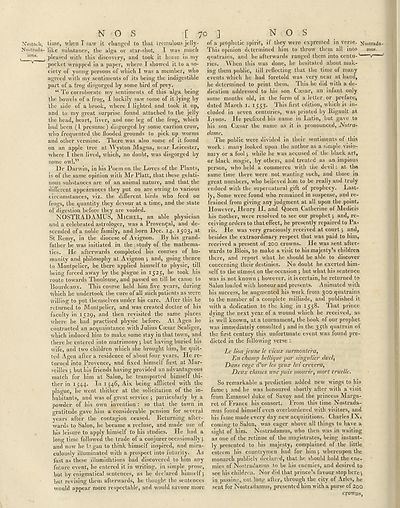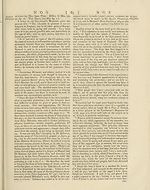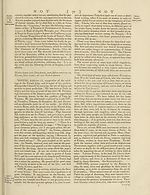Encyclopaedia Britannica > Volume 15, NIC-PAR
(82) Page 70
Download files
Complete book:
Individual page:
Thumbnail gallery: Grid view | List view

N ' O S rl 70 ] NOS
Xostocli, time, v.li-en I saw it changed to that tremulous jelly-
Nostrada- like substance, the alga or star-shot. I was much
1 pleased with this discovery, and took it home in my
pocket wrapped in a paper, where I showed it to a so¬
ciety of young persons of which I was a member, who
agreed with my sentiments of its being the indigestible
part of a frog disgorged by some bird of prey.
“ To corroborate my sentiments of this alga being
the bowels of a frog, 1 luckily saw some of it lying by
the side of a brook, where I lighted and took it up,
and to my great surprise found attached to the jelly
the head, heart, liver, and one leg of the frog, which
had been (L presume) disgorged by some carrion crow,
who frequented the Hooded grounds to pick up worms
and other vermine. There was also some ol it found
on an apple tree at Wyston Magna, near Leicester,
where I then lived, which, no doubt, was disgorged by
some owl.'’
Dr Darwin, in his Poem on the Loves of the Plants,
is of the same opinion with Mr Platt, that these gelati¬
nous substances are of an animal nature, and that the
different appearances they put on are otying to various
circumstances, viz. the dillercnt birds who feed on
frogs, the quantity they devour at a time, and the state
of digestion before they are voided.
NOSTRADAMUS, Michel, an able physician
and a celebrated astrologer, was a Provencal, and de¬
scended of a noble family, and born Dec. 14. J5°3> at
St Remy, in the diocese of Avignon. By his grand¬
father he was initiated in the study of the mathema¬
tics. He afterwards completed his courses of hu¬
manity and philosophy at Avignon ; and, going thence
to Montpelier, he there applied himself to physic, till
being forced away by the plague in 1525, he took his
route towards Thoulouse, and passed on till he came to
Bourdeaux. This course held him five years, during
which he undertook the cure oi all such patients as rvere
willing to put themselves under his care. After this he
returned to Montpelier, and was created doctor of his
faculty in 1529, and then revisited the same places
where he had practised physic before. At Agen he
contracted an acquaintance with Julius Caesar Scaliger,
which induced him to make some stay in that town, and
there he entered into matrimony j but having buried his
wife, and two children which she brought him, he quit¬
ted Agen after a residence of about four years. He re¬
turned into Provence, and fixed himself first at Mar¬
seilles •, but his friends having provided an advantageous
match for him at Salon, he transported himself thi¬
ther in 1544. In 1546, Aix being afflicted with the
plague, he went thither at the solicitation of the in¬
habitants, and was of great service 5 particularly by a
powder of his own invention : so that the town in
gratitude gave him a considerable pension for several
years after the contagion ceased. Returning after¬
wards to Salon, he became a recluse, and made use of
his leisure to apply himself to his studies. He had a
long time followed the trade of a conjurer occasionally j
and now he began to think himself inspired, and mira¬
culously illuminated with a prospect into futurity. As
fast as these illuminations had discovered to him any
future event, he entered it in writing, in simple prose,
but by enigmatical sentences, as he declared himself j
but revising them afterwards, he thought the sentences
would appear more respectable, and would savour more
of a prophetic spirit, if they were expressed in verse. Nostrada-
This opinion determined him to throw them all into mus.
quatrains, and he afterwards ranged them into centu-1 s—*-1
lies. When this was done, he hesitated about mak¬
ing them public, till reflecting that the time of many
events which he had foretold was very near at hand,
he determined to print them. This he did with a de¬
dication addressed to his son Caesar, an infant only
some months old, in the form of a letter or preface,
dated March 1. 1555. This first edition, which is in¬
cluded in seven centuries, was printed by Rigault at
Lyons. He prefixed his name in Latin, but gave to
his son Ciesar the name as it is pronounced, JXolra-
dame.
The public wrere divided in their sentiments of this
work : many looked upon the author as a simple visio¬
nary or a fool 5 while he was accused ol the black art,
or black magic, by others, and treated as an impious
person, who held a commerce w'ith the devil: at the
same time there were not wanting such, and those in
great numbers, who believed him to be really and truly
endued with the supernatural gift of prophecy. Last¬
ly, Some were found who remained in suspense, and re¬
frained from giving any judgment at all upon the point#
However, Henry II. and Queen Catherine of Medicis
his mother, were resolved to see our prophet $ and, re¬
ceiving orders to that effect, he presently repaired to Pa¬
ris. He was very graciously received at court; and,
besides the extraordinary respect that was paid to him,
received a present of 200 crowns. He was sent after¬
wards to Blois, to make a visit to his majesty’s children
there, and report what he should be able to discover
concerning their destinies. No doubt he exerted him¬
self to the utmost on the occasion 5 hut what his sentence
was is not known •, however, it is certain, he returned to
Salon loaded with honour and presents. Animated with
his success, he augmented his work from 300 quatrains
to the number of a complete milliade, and published it
with a dedication to the king in 1558. That prince
dying the next year of a w’ound which he received, as
is well known, at a tournament, the book of our prophet
was immediately consulted ; and in the 35th quatrain of
the first century this unfortunate event was found pre¬
dicted in the following verse :
Lc lionjcutie Ic vieux surmontera,
En champ bclliquc par singulicr duel)
Dans cage d'or les yeux hit crevera,
Dcilx classes tinc puis mourir, mart crucllc.
So remarkable a prediction added new wings to his
fame j and he was honoured shortly after with a visit
from Emanuel duke of Savoy and the princess Marga¬
ret of France his consort. From this time Nostrada¬
mus found himself even overburdened with visitors, and
his fame made every day new acquisitions. Charles IX#
coming to Salon, was eager above all things to have a
sight of him. Nostradamus, who then was in waiting
as one of the retinue of the magistrates, being instant¬
ly presented to his majesty, complained of the little
esteem his countrymen had for him \ whereupon the
monarch publicly declared, that he should hold the ene¬
mies of Nostradamus to be his enemies, and desired to
see his children. Nor did that prince’s favour stop here *,
in passing,, not long after, through the city of Arles, he
sent for Nostradamus, presented him w ith a purse of 200
crowns,
Xostocli, time, v.li-en I saw it changed to that tremulous jelly-
Nostrada- like substance, the alga or star-shot. I was much
1 pleased with this discovery, and took it home in my
pocket wrapped in a paper, where I showed it to a so¬
ciety of young persons of which I was a member, who
agreed with my sentiments of its being the indigestible
part of a frog disgorged by some bird of prey.
“ To corroborate my sentiments of this alga being
the bowels of a frog, 1 luckily saw some of it lying by
the side of a brook, where I lighted and took it up,
and to my great surprise found attached to the jelly
the head, heart, liver, and one leg of the frog, which
had been (L presume) disgorged by some carrion crow,
who frequented the Hooded grounds to pick up worms
and other vermine. There was also some ol it found
on an apple tree at Wyston Magna, near Leicester,
where I then lived, which, no doubt, was disgorged by
some owl.'’
Dr Darwin, in his Poem on the Loves of the Plants,
is of the same opinion with Mr Platt, that these gelati¬
nous substances are of an animal nature, and that the
different appearances they put on are otying to various
circumstances, viz. the dillercnt birds who feed on
frogs, the quantity they devour at a time, and the state
of digestion before they are voided.
NOSTRADAMUS, Michel, an able physician
and a celebrated astrologer, was a Provencal, and de¬
scended of a noble family, and born Dec. 14. J5°3> at
St Remy, in the diocese of Avignon. By his grand¬
father he was initiated in the study of the mathema¬
tics. He afterwards completed his courses of hu¬
manity and philosophy at Avignon ; and, going thence
to Montpelier, he there applied himself to physic, till
being forced away by the plague in 1525, he took his
route towards Thoulouse, and passed on till he came to
Bourdeaux. This course held him five years, during
which he undertook the cure oi all such patients as rvere
willing to put themselves under his care. After this he
returned to Montpelier, and was created doctor of his
faculty in 1529, and then revisited the same places
where he had practised physic before. At Agen he
contracted an acquaintance with Julius Caesar Scaliger,
which induced him to make some stay in that town, and
there he entered into matrimony j but having buried his
wife, and two children which she brought him, he quit¬
ted Agen after a residence of about four years. He re¬
turned into Provence, and fixed himself first at Mar¬
seilles •, but his friends having provided an advantageous
match for him at Salon, he transported himself thi¬
ther in 1544. In 1546, Aix being afflicted with the
plague, he went thither at the solicitation of the in¬
habitants, and was of great service 5 particularly by a
powder of his own invention : so that the town in
gratitude gave him a considerable pension for several
years after the contagion ceased. Returning after¬
wards to Salon, he became a recluse, and made use of
his leisure to apply himself to his studies. He had a
long time followed the trade of a conjurer occasionally j
and now he began to think himself inspired, and mira¬
culously illuminated with a prospect into futurity. As
fast as these illuminations had discovered to him any
future event, he entered it in writing, in simple prose,
but by enigmatical sentences, as he declared himself j
but revising them afterwards, he thought the sentences
would appear more respectable, and would savour more
of a prophetic spirit, if they were expressed in verse. Nostrada-
This opinion determined him to throw them all into mus.
quatrains, and he afterwards ranged them into centu-1 s—*-1
lies. When this was done, he hesitated about mak¬
ing them public, till reflecting that the time of many
events which he had foretold was very near at hand,
he determined to print them. This he did with a de¬
dication addressed to his son Caesar, an infant only
some months old, in the form of a letter or preface,
dated March 1. 1555. This first edition, which is in¬
cluded in seven centuries, was printed by Rigault at
Lyons. He prefixed his name in Latin, but gave to
his son Ciesar the name as it is pronounced, JXolra-
dame.
The public wrere divided in their sentiments of this
work : many looked upon the author as a simple visio¬
nary or a fool 5 while he was accused ol the black art,
or black magic, by others, and treated as an impious
person, who held a commerce w'ith the devil: at the
same time there were not wanting such, and those in
great numbers, who believed him to be really and truly
endued with the supernatural gift of prophecy. Last¬
ly, Some were found who remained in suspense, and re¬
frained from giving any judgment at all upon the point#
However, Henry II. and Queen Catherine of Medicis
his mother, were resolved to see our prophet $ and, re¬
ceiving orders to that effect, he presently repaired to Pa¬
ris. He was very graciously received at court; and,
besides the extraordinary respect that was paid to him,
received a present of 200 crowns. He was sent after¬
wards to Blois, to make a visit to his majesty’s children
there, and report what he should be able to discover
concerning their destinies. No doubt he exerted him¬
self to the utmost on the occasion 5 hut what his sentence
was is not known •, however, it is certain, he returned to
Salon loaded with honour and presents. Animated with
his success, he augmented his work from 300 quatrains
to the number of a complete milliade, and published it
with a dedication to the king in 1558. That prince
dying the next year of a w’ound which he received, as
is well known, at a tournament, the book of our prophet
was immediately consulted ; and in the 35th quatrain of
the first century this unfortunate event was found pre¬
dicted in the following verse :
Lc lionjcutie Ic vieux surmontera,
En champ bclliquc par singulicr duel)
Dans cage d'or les yeux hit crevera,
Dcilx classes tinc puis mourir, mart crucllc.
So remarkable a prediction added new wings to his
fame j and he was honoured shortly after with a visit
from Emanuel duke of Savoy and the princess Marga¬
ret of France his consort. From this time Nostrada¬
mus found himself even overburdened with visitors, and
his fame made every day new acquisitions. Charles IX#
coming to Salon, was eager above all things to have a
sight of him. Nostradamus, who then was in waiting
as one of the retinue of the magistrates, being instant¬
ly presented to his majesty, complained of the little
esteem his countrymen had for him \ whereupon the
monarch publicly declared, that he should hold the ene¬
mies of Nostradamus to be his enemies, and desired to
see his children. Nor did that prince’s favour stop here *,
in passing,, not long after, through the city of Arles, he
sent for Nostradamus, presented him w ith a purse of 200
crowns,
Set display mode to:
![]() Universal Viewer |
Universal Viewer | ![]() Mirador |
Large image | Transcription
Mirador |
Large image | Transcription
Images and transcriptions on this page, including medium image downloads, may be used under the Creative Commons Attribution 4.0 International Licence unless otherwise stated. ![]()
| Encyclopaedia Britannica > Encyclopaedia Britannica > Volume 15, NIC-PAR > (82) Page 70 |
|---|
| Permanent URL | https://digital.nls.uk/192582764 |
|---|
| Attribution and copyright: |
|
|---|
| Shelfmark | EB.11 |
|---|---|
| Description | Ten editions of 'Encyclopaedia Britannica', issued from 1768-1903, in 231 volumes. Originally issued in 100 weekly parts (3 volumes) between 1768 and 1771 by publishers: Colin Macfarquhar and Andrew Bell (Edinburgh); editor: William Smellie: engraver: Andrew Bell. Expanded editions in the 19th century featured more volumes and contributions from leading experts in their fields. Managed and published in Edinburgh up to the 9th edition (25 volumes, from 1875-1889); the 10th edition (1902-1903) re-issued the 9th edition, with 11 supplementary volumes. |
|---|---|
| Additional NLS resources: |
|

